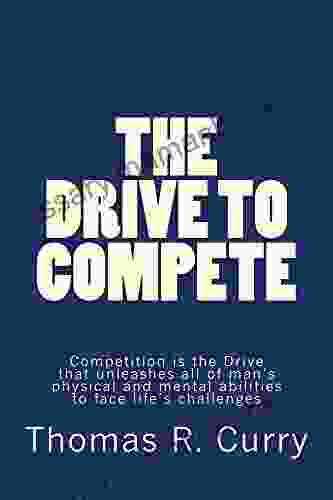The Drive to Compete: An Exploration of the Psychological and Physiological Motivations for Athletic Excellence

Athletes are often driven by an insatiable desire to compete and achieve excellence. This drive can be seen in athletes of all ages and abilities, from young children competing in their first sports day to elite athletes vying for Olympic gold. But what is it that drives athletes to push themselves to the limit and strive for greatness? Is it simply a matter of genetics, or are there other factors at play?
5 out of 5
| Language | : | English |
| File size | : | 276 KB |
| Text-to-Speech | : | Enabled |
| Screen Reader | : | Supported |
| Enhanced typesetting | : | Enabled |
| Print length | : | 2 pages |
| Lending | : | Enabled |
In this article, we will explore the psychological and physiological motivations that drive athletes to compete. We will discuss the role of genetics, personality traits, and environmental factors in shaping athletic motivation. We will also examine the neurophysiological mechanisms underlying athletic performance and the psychological benefits of competition.
## The Role of Genetics in Athletic Motivation
There is no doubt that genetics play a role in athletic motivation. Studies have shown that certain genes are associated with increased levels of competitiveness, ambition, and drive. For example, one study found that athletes who were homozygous for the allele DRD4-7R were more likely to be competitive and driven to succeed than athletes who were heterozygous or homozygous for the DRD4-4R allele.
However, it is important to note that genetics are not the only factor that influences athletic motivation. Environmental factors, such as family environment, coaching, and peer pressure, can also play a significant role.
## The Role of Personality Traits in Athletic Motivation
Personality traits can also influence athletic motivation. Athletes who are high in competitiveness, ambition, and drive are more likely to be motivated to succeed in sports. These athletes are also more likely to be willing to put in the hard work and dedication required to achieve their goals.
In addition to competitiveness, ambition, and drive, other personality traits that have been linked to athletic motivation include:
- Optimism
- Resilience
- Self-confidence
- Self-discipline
## The Role of Environmental Factors in Athletic Motivation
Environmental factors can also play a significant role in athletic motivation. Family environment, coaching, and peer pressure can all influence an athlete's motivation to compete and achieve excellence.
Athletes who grow up in families that emphasize competition and achievement are more likely to be motivated to succeed in sports. These athletes may also have parents who are former athletes or coaches, who can provide them with valuable advice and support.
Coaching can also play a significant role in athletic motivation. A good coach can help athletes to develop their skills, build their confidence, and set realistic goals. Coaches can also provide athletes with the support and encouragement they need to overcome challenges and achieve their full potential.
Peer pressure can also influence athletic motivation. Athletes who are surrounded by friends and teammates who are also motivated to succeed are more likely to be motivated themselves. This is because athletes who are surrounded by positive role models are more likely to adopt the same values and behaviors.
## The Neurophysiological Mechanisms Underlying Athletic Performance
The neurophysiological mechanisms underlying athletic performance are complex and involve many different brain regions. However, research has shown that certain brain regions are particularly important for athletic performance, including the:
- Prefrontal cortex
- Basal ganglia
- Cerebellum
- Brainstem
The prefrontal cortex is responsible for planning, decision-making, and working memory. It is also involved in regulating emotions and motivation. The basal ganglia are responsible for coordinating movement and learning new motor skills. The cerebellum is responsible for balance and coordination. The brainstem is responsible for controlling vital functions such as breathing and heart rate.
During athletic performance, these brain regions work together to control movement, make decisions, and regulate emotions. The prefrontal cortex plans the movement and sets the goals, the basal ganglia coordinate the movement, the cerebellum ensures that the movement is smooth and coordinated, and the brainstem controls the vital functions that are necessary for athletic performance.
## The Psychological Benefits of Competition
Competition can have a number of psychological benefits for athletes, including:
- Increased motivation
- Improved focus and concentration
- Increased self-confidence
- Greater resilience
- Enhanced social skills
Competition can increase motivation by providing athletes with a goal to strive for and a way to measure their progress. Competition can also improve focus and concentration by forcing athletes to stay focused on the task at hand. Competition can also increase self-confidence by giving athletes the opportunity to test their abilities and see what they are capable of. Competition can also make athletes more resilient by teaching them how to deal with setbacks and challenges. Finally, competition can enhance social skills by providing athletes with the opportunity to interact with other athletes and learn how to work together as a team.
##
The drive to compete is a complex phenomenon that is influenced by a variety of factors, including genetics, personality traits, and environmental factors. The neurophysiological mechanisms underlying athletic performance are also complex and involve many different brain regions. However, research has shown that certain brain regions are particularly important for athletic performance, including the prefrontal cortex, basal ganglia, cerebellum, and brainstem.
Competition can have a number of psychological benefits for athletes, including increased motivation, improved focus and concentration, increased self-confidence, greater resilience, and enhanced social skills. Therefore, competition can be a valuable tool for athletes who are looking to improve their performance and achieve their full potential.
5 out of 5
| Language | : | English |
| File size | : | 276 KB |
| Text-to-Speech | : | Enabled |
| Screen Reader | : | Supported |
| Enhanced typesetting | : | Enabled |
| Print length | : | 2 pages |
| Lending | : | Enabled |
Do you want to contribute by writing guest posts on this blog?
Please contact us and send us a resume of previous articles that you have written.
 Top Book
Top Book Novel
Novel Fiction
Fiction Nonfiction
Nonfiction Literature
Literature Paperback
Paperback Hardcover
Hardcover E-book
E-book Audiobook
Audiobook Bestseller
Bestseller Classic
Classic Mystery
Mystery Thriller
Thriller Romance
Romance Fantasy
Fantasy Science Fiction
Science Fiction Biography
Biography Memoir
Memoir Autobiography
Autobiography Poetry
Poetry Drama
Drama Historical Fiction
Historical Fiction Self-help
Self-help Young Adult
Young Adult Childrens Books
Childrens Books Graphic Novel
Graphic Novel Anthology
Anthology Series
Series Encyclopedia
Encyclopedia Reference
Reference Guidebook
Guidebook Textbook
Textbook Workbook
Workbook Journal
Journal Diary
Diary Manuscript
Manuscript Folio
Folio Pulp Fiction
Pulp Fiction Short Stories
Short Stories Fairy Tales
Fairy Tales Fables
Fables Mythology
Mythology Philosophy
Philosophy Religion
Religion Spirituality
Spirituality Essays
Essays Critique
Critique Commentary
Commentary Glossary
Glossary Bibliography
Bibliography Index
Index Table of Contents
Table of Contents Preface
Preface Introduction
Introduction Foreword
Foreword Afterword
Afterword Appendices
Appendices Annotations
Annotations Footnotes
Footnotes Epilogue
Epilogue Prologue
Prologue Connie Berry
Connie Berry John Piper
John Piper Joy Manning
Joy Manning Michael Winicott
Michael Winicott Olesija Saue
Olesija Saue Suzuki Tanaka
Suzuki Tanaka Xi Liu
Xi Liu Dion Anja
Dion Anja Juan Antonio Fernandez
Juan Antonio Fernandez David C Coleman
David C Coleman Susan Elkin
Susan Elkin Caroline Kepnes
Caroline Kepnes Therese Quinn
Therese Quinn Sidney Sheldon
Sidney Sheldon Marius Gabriel
Marius Gabriel Victor Hugo
Victor Hugo Judith Kuhn
Judith Kuhn Dr Steven R Gundry
Dr Steven R Gundry Tiffany Washington
Tiffany Washington Mary Stewart
Mary Stewart
Light bulbAdvertise smarter! Our strategic ad space ensures maximum exposure. Reserve your spot today!

 Dylan MitchellThe Beano Presents Dennis the Menace and Gnasher - A Nostalgic Adventure into...
Dylan MitchellThe Beano Presents Dennis the Menace and Gnasher - A Nostalgic Adventure into...
 Grant HayesBuilding a Restorative School Community: A Comprehensive Guide for Educators...
Grant HayesBuilding a Restorative School Community: A Comprehensive Guide for Educators... Darren NelsonFollow ·4.4k
Darren NelsonFollow ·4.4k Brandon CoxFollow ·7.8k
Brandon CoxFollow ·7.8k Dean CoxFollow ·14.6k
Dean CoxFollow ·14.6k Aron CoxFollow ·9.2k
Aron CoxFollow ·9.2k Walt WhitmanFollow ·18.6k
Walt WhitmanFollow ·18.6k Hugh ReedFollow ·4.5k
Hugh ReedFollow ·4.5k Reginald CoxFollow ·13.9k
Reginald CoxFollow ·13.9k Nathaniel HawthorneFollow ·7.3k
Nathaniel HawthorneFollow ·7.3k

 Cody Blair
Cody BlairWill You Ever Pee Alone Again? The Future of Bathroom...
The bathroom has long been a place of...

 Al Foster
Al FosterNine Years Among the Indians 1870-1879: Witnessing Their...
In the annals of American...

 Pete Blair
Pete BlairYekl and the Imported Bridegroom: A Window into the New...
Abraham Cahan's Yekl and the...

 Pablo Neruda
Pablo NerudaSearch Engine Optimization Guide: A Non-Technical...
In today's digital landscape, having a...

 Nikolai Gogol
Nikolai GogolOne Piece Vol 77: Smile - The Saga Continues with...
The Enthralling World...

 Dan Henderson
Dan HendersonThree Farmers On Their Way To Dance
In a quaint countryside...
5 out of 5
| Language | : | English |
| File size | : | 276 KB |
| Text-to-Speech | : | Enabled |
| Screen Reader | : | Supported |
| Enhanced typesetting | : | Enabled |
| Print length | : | 2 pages |
| Lending | : | Enabled |








